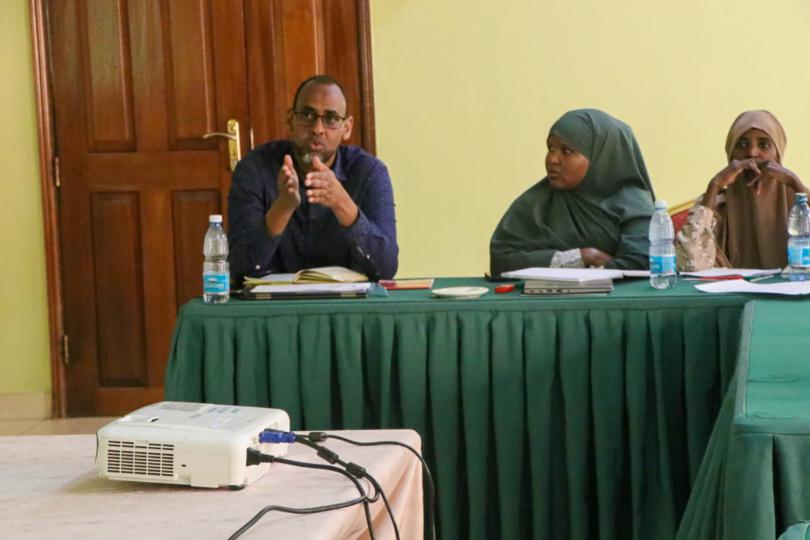STRENGTHENING LOCALISATION IN SAVE THE CHILDREN’S DROUGHT RESPONSE IN GARISSA COUNTY

WOKIKE staff lead a hygiene promotion session to help the local community combat the cholera outbreak.
By Yussuf Gedi, Garissa Programme Manager, Save the Children Kenya and Madagascar
Shifting the power by devolving it to children and communities, establishing meaningful strategic partnerships, and investing in local expert organizations are integral components of Save the Children's 2022-2024 global strategy. Local organizations serve as the initial responders to crises because of their presence within the affected communities. Therefore, empowering them with resources and technical support ensures timely, appropriate, and effective outcomes for those most affected.
In Garissa, Save the Children has partnered with Women Kind Kenya (WOKIKE) for the implementation of a drought response programme. WOKIKE was established as a Civil Society Organization (CSO) with the aim of empowering affected communities to address challenges related to protection, education, livelihoods, nutrition, health, and sanitation. However, this local organization has encountered financial and technical obstacles that have hindered its capacity to respond fully to crises within the community.
Deep dive on our partnership with WOKIKE
Save the Children entered into a partnership with WOKIKE in 2021 to assist the CSO in addressing some of the challenges it was encountering and to facilitate its ongoing humanitarian response within the community. In 2021, we conducted a capacity assessment to pinpoint areas where WOKIKE required support.
Following this exercise, we identified the following challenges:
- Difficulty in accessing flexible funding for institutional capacity strengthening.
- Limited technical support on finance and compliance.
- Limited technical support in thematic areas like nutrition, water, sanitation and hygiene (WASH) and food security and livelihood.
A capacity-strengthening plan was then put in place and through funding from USAID’s Bureau for Humanitarian Assistance (BHA), Save the Children sub-granted WOKIKE and provided Indirect Cost Recovery (ICR) that supported the CSO meet some of its institutional capacity strengthening needs including the development of their Strategic Plan, 2023-2027, staff training on resource mobilization and recruitments. This was followed by continuous technical support where our technical specialists held monthly meetings with the team to review implementation and provide technical guidance.

Abdullahi Abdi, WOKIKE’s Executive Director sharing insights during WOKIKE and Save the Children’s capacity assessment session.
“Within this collaborative effort, Save the Children is actively implementing its localisation strategy, which involves transferring resources and building the capacity of local organizations. WOKIKE, in this context, stands as a significant beneficiary of this intervention, reaping dual benefits, namely access to flexible Indirect Cost Recovery (ICR) and access to technical support.” Abdullahi Abdi - WOKIKE Executive Director
“The invaluable assistance we have received from Save the Children has enabled us to enhance our competence in planning, executing, and overseeing humanitarian interventions with greater effectiveness. Additionally, it has been instrumental in aligning our practices with global humanitarian standards, elevating the quality of our humanitarian efforts. This alignment has not only improved the overall delivery of our interventions but has also fostered their broader acceptance and coordination within the humanitarian ecosystem,” says Abdullahi.
Other than technical support for the project, Save the Children ensures that WOKIKE participates in project designs and contributes to bi-annual and annual project reports. Our Monitoring, Evaluation, Accountability and Learning (MEAL), supply chain, finance, compliance and safeguarding teams also work closely with the CSO to improve their systems and strengthen their capacities in these areas.
WOKIKE started with a few interventions in 2021 mainly covering one sub-county but have since expanded their operations and are now covering more areas. Their technical capacity has also been strengthened so much so that they are also taking lead in one of the key interventions in Water Sanitation and Hygiene (WASH) in all the five sub-counties targeted by the project.




